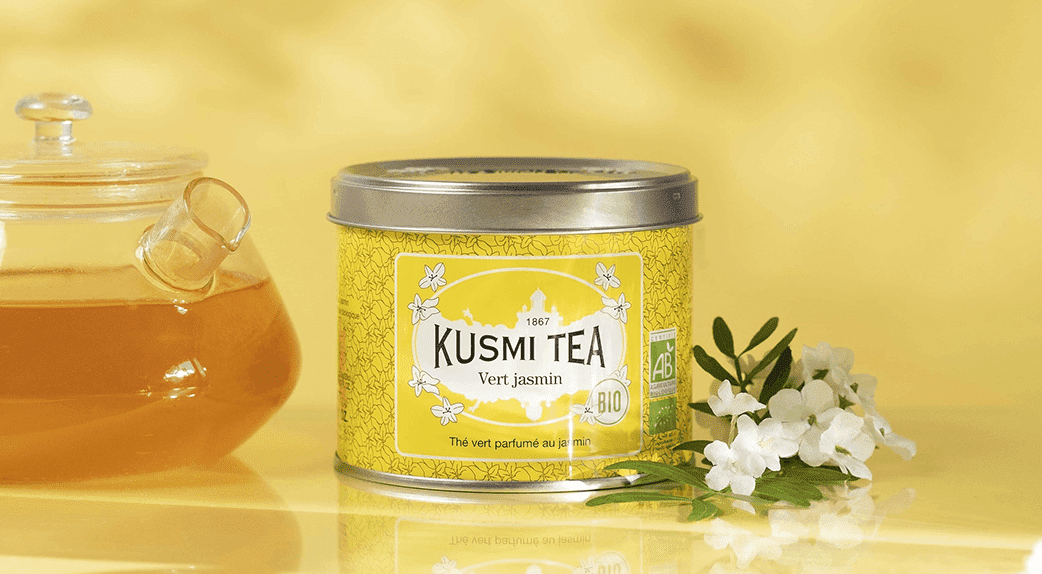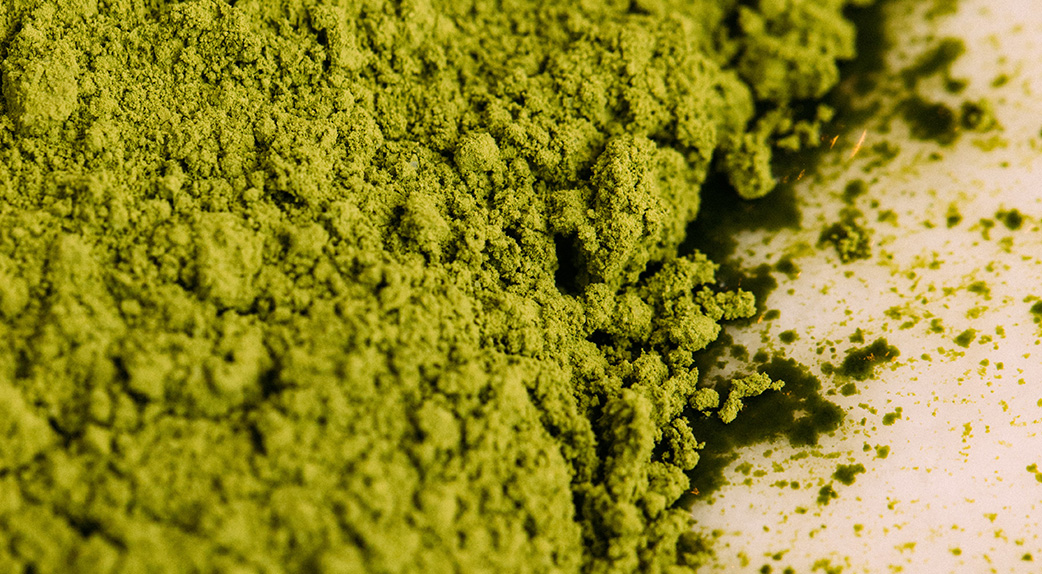Published on 09/04/2025
TeaThe benefits of ginseng: Properties, uses, and health tips

After Sleep Ritual, Immune Defenses, and our Slimming Tea Ritual, the Ritual range expands with a new blend of green tea and yerba mate, enriched with ginseng extract: Memory Ritual. Designed to enhance your brain performance, this tea will become an essential ally in your daily routine.
Discover the benefits of this Asian root, a key ingredient in phytotherapy, and the active component of this new ritual that will boost your energy, immunity, and memory… And learn how to use it effectively to improve your daily health!

What is ginseng?
Ginseng is a renowned herbal remedy celebrated for its diverse medicinal properties. This adaptogenic plant has been utilized for centuries in both traditional and modern medicine to enhance overall health. Ginseng is especially valued for its potential to boost energy, improve cognitive function, and strengthen the immune system. It is widely regarded for its beneficial effects on general wellness, making it a go-to supplement for many individuals looking to improve their health.
Origin
Panax ginseng, the most common type of ginseng, is native to Asia and North America, thriving particularly in countries like Korea, China, and the United States. The root of the ginseng plant is considered the most valuable part, containing potent bioactive compounds known as ginsenosides, which are believed to be responsible for its remarkable health benefits. These ginsenosides are central to ginseng's adaptogenic qualities, which support the body's ability to manage stress and enhance resilience.
What is an adaptogenic plant?
An adaptogen is a natural substance that helps the body maintain balance during times of stress. Ginseng is classified as an adaptogen due to its ability to regulate the body’s response to both physical and mental stress. It works by boosting the immune system and improving the body’s capacity to adapt to environmental stressors. Adaptogens like ginseng support optimal health by enhancing the body's resilience against diseases and boosting overall vitality.
Ginseng cultivation
While ginseng grows best in the wild, it is also cultivated in controlled environments, especially in regions like Korea. Ginseng cultivation requires nutrient-rich soil and takes several years for the root to reach maturity, ensuring it contains the highest levels of ginsenosides. The process is labor-intensive, and the age of the root is critical in extracting its medicinal benefits.

The main benefits of ginseng
Boosts energy and reduces fatigue
One of the primary ginseng benefits is its ability to combat fatigue and increase energy levels. Studies have shown that ginseng extract helps improve physical endurance and mental clarity. Panax ginseng is particularly effective in boosting energy levels for people with low stamina or those suffering from chronic fatigue. Regular consumption of ginseng can be a great way to enhance vitality and reduce feelings of tiredness.
Enhances cognitive function
Research has indicated that ginseng is beneficial for improving memory, concentration, and overall cognitive function. This makes it a useful supplement for students, professionals, and anyone looking to sharpen their mental performance. Both Panax ginseng and American ginseng have been found to help prevent cognitive decline, making ginseng a powerful herb for brain health.
Strengthens the immune system
Ginseng is known to boost the immune system, helping to enhance the body’s resistance to infections and illnesses. The active compounds in ginseng stimulate the production of white blood cells, which play a key role in protecting the body from pathogens. Whether consumed regularly or as part of a seasonal cure, ginseng is a great herb for maintaining overall health.
Potential benefits for diabetes
Studies suggest that ginseng may have a positive impact on blood sugar levels, particularly for those with type 2 diabetes. Ginseng may help reduce insulin resistance and improve glucose control. By regulating blood sugar levels, ginseng can be an important tool for managing diabetes, offering an alternative natural approach to complement other treatments.
Supports skin health
The antioxidant properties of ginseng also make it beneficial for skin health. Compounds like ginsenosides help protect the skin from environmental stressors, improve skin elasticity, and promote a healthy, radiant complexion. As a result, ginseng is commonly used in skincare products aimed at improving skin appearance and preventing signs of aging.
How to consume ginseng
Ginseng can be consumed in a variety of ways, making it easy to incorporate into your daily routine. Whether in the form of tea, capsules, powders, or ginseng extract, each form offers unique benefits depending on your needs.
Ginseng tea
One of the most popular ways to enjoy the benefits of ginseng is through ginseng tea. This soothing beverage has a mild flavor and can be consumed regularly to experience its health-enhancing properties. Ginseng tea is particularly useful for boosting cognitive function and energy.
Ginseng extracts and supplements
For those seeking a more potent effect, ginseng supplements and extracts provide concentrated doses of ginseng. These products are ideal for individuals looking for higher doses of ginsenosides to support energy, immunity, and cognitive performance.
What are the differences between yellow and red ginseng?
Ginseng is available in different varieties, including yellow and red ginseng. The main difference lies in the processing method. Yellow ginseng is typically the raw, unprocessed root, while red ginseng is steamed and dried, which enhances its medicinal properties. Red ginseng is often considered more potent due to this unique processing, offering a higher concentration of ginsenosides that contribute to its effectiveness.
Ritual Memory tea
For those seeking cognitive support, a ritual memory tea made with green tea and yerba mate ginseng can be an excellent choice. This tea blends ginseng with other herbs and natural ingredients to boost brain health, improve memory recall, and support concentration. It’s an excellent way to incorporate the benefits of ginseng into your daily routine for better mental clarity.
Discover now our Ginseng Tea !

What precautions should be taken?
Ginseng, especially Panax ginseng, is a widely used herbal remedy known for its numerous ginseng benefits. However, precautions should be taken before using this herb, particularly if you have specific health conditions or are on certain medications. While ginseng is generally considered safe, side effects may occur, especially in cases of overconsumption. Before starting a ginseng regimen, it's recommended to consult a healthcare professional, especially if you have medical conditions such as diabetes, heart disease, or hypertension, or if you are pregnant or breastfeeding.
Ginseng extract may interact with medications that affect the immune system, such as immunosuppressants or those used for blood sugar control in diabetes. Additionally, ginseng can affect blood pressure medications and anticoagulants. If you're unsure, consulting your doctor is the safest way to avoid any severe side effects, ensuring that your treatment is both effective and safe.
Contraindications
While the ginseng benefits are widely recognized, certain individuals should avoid using ginseng, particularly those with underlying conditions such as high blood pressure or cardiovascular issues. Ginseng can interfere with the effects of some medications, and its stimulating properties may exacerbate anxiety or insomnia in some users. If you are undergoing surgery, it's crucial to stop using ginseng well in advance, as it may affect blood clotting. Pregnant or breastfeeding women should also avoid ginseng, as there is limited research on its safety during these times.
Ginseng should be avoided by people who suffer from severe sugar imbalances or are on medications that regulate glucose levels, unless under professional supervision. It is also advised to avoid taking ginseng when combined with medications that affect the immune system.
Side effects and overdose of ginseng
Though ginseng is generally safe, it can cause side effects in some cases, particularly when consumed in excess. Common side effects include headaches, digestive issues, dizziness, and insomnia. Overuse of ginseng may lead to more severe symptoms, including nervousness, heart palpitations, or even allergic reactions. High doses of ginseng can have a profound effect on the nervous system, leading to agitation or restlessness.
If you exceed the recommended dosage, the risk of overdose increases, which may lead to adverse effects like increased blood pressure or disturbances in the immune system. Always follow the recommended dosage to ensure you reap the ginseng benefits without unwanted side effects.
What is the recommended daily dose?
The recommended daily dose of ginseng can vary depending on the form you use, such as ginseng tea, capsules, or ginseng extract. For Panax ginseng, the typical safe dose is around 200-400 mg per day of the extract, which provides sufficient ginsenosides. For ginseng tea, 1-2 cups per day is usually enough to experience its health benefits without overwhelming the body.
It’s essential to stick to the recommended daily dose provided by the manufacturer or a healthcare provider. Overuse of ginseng can lead to side effects like insomnia or heart palpitations. If you're unsure about the appropriate dosage, it's best to consult your healthcare professional for guidance.
Adopt the Ritual Memory and enjoy the benefits of ginseng every day!
Incorporating ginseng into your daily routine can help you experience the long-term benefits of this remarkable herb. Whether through ginseng-based tea or supplements, adopting a Ritual Memory or regular ginseng intake can support improved memory, concentration, and energy. Over time, this consistent use helps boost the immune system, supports cognitive function, and enhances overall health.
By consuming ginseng every day, you ensure that your body benefits from its adaptogenic properties, which help reduce stress and fatigue, while improving the body's response to environmental changes. The ginseng root is rich in compounds like ginsenosides, which play a crucial role in supporting your body’s functions.

YOUR QUESTIONS:
Is it good to take ginseng every day?
Taking ginseng every day can provide significant long-term benefits, including enhanced energy, improved memory, and better immune function. Regular intake of Panax ginseng or American ginseng may also help reduce fatigue, making it an excellent addition to your daily routine. However, it's essential to follow the recommended dosage to avoid side effects.
Why is ginseng useful in seasonal cures?
Ginseng is particularly effective in seasonal cures due to its ability to help the body adapt to changing environments and stresses. During colder months, when immune function is often challenged, ginseng supports the immune system and helps prevent illnesses like colds and flu. Its adaptogenic properties help regulate energy levels, making it an excellent herbal remedy for winter fatigue.
In what contexts can Ritual Memory be beneficial?
Ritual Memory can be beneficial in various contexts, particularly for those looking to improve cognitive function and mental clarity. Whether you're a student studying for exams or a professional needing enhanced concentration, Ritual Memory helps boost memory retention and cognitive performance. It’s also useful for those experiencing mental fatigue, as it aids in restoring mental sharpness and focus.
Does ginseng make you sleep?
While ginseng does not directly induce sleep, it may help regulate sleep patterns by reducing stress and improving overall energy levels. By combating fatigue and promoting a calm mind, ginseng can indirectly support better sleep. However, since it can have mild stimulating effects, it's advisable to avoid taking ginseng close to bedtime.
Can ginseng be combined with other plants?
Yes, ginseng can be combined with other plants to enhance its effects. Common combinations include ginseng with ginkgo biloba for cognitive function or with ashwagandha for stress relief. These combinations work synergistically to provide more comprehensive health benefits. However, before combining ginseng with other herbs, it’s essential to check for potential interactions and consult a healthcare provider if necessary.







